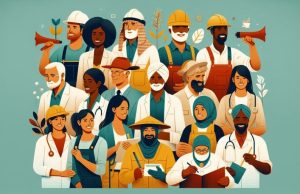In recent decades, globalization has emerged as a transformative power, redefining the parameters within which economies operate, cultures evolve, and career trajectories are charted. As the world becomes increasingly interconnected, the very nature of work is undergoing a seismic shift. In this exploration, we delve into the fabric of a globalized career landscape, examining both the boundless opportunities it presents and the multifaceted challenges it brings to the fore.
The advent of remote work and the proliferation of digital collaboration tools have demolished traditional geographical barriers, enabling professionals to offer their skills to employers and clients worldwide. This has resulted in a significant expansion of the job market, allowing individuals in disparate locations to compete for roles that were once the exclusive preserve of locals. Remote work has not only democratized access to employment but has also spurred innovation by creating diverse teams that bring together a mosaic of perspectives.
However, this new frontier is not without its perils. Job security has become a pressing concern as the gig economy expands and the fight for contracts grows fiercer. Professionals are now expected to constantly upscale their expertise to stay relevant in an environment where the next competitor is just a click away. Skill requirements are evolving at an unprecedented pace, pressuring workers to become lifelong learners and adapt quickly to technological advances.
The globalized job market also has profound implications for cultural dynamics within the professional space. Cultural competence has escalated from a desirable trait to an indispensable asset. International business dealings now necessitate not only language fluency but also an acute sensitivity to cultural nuances. When managed effectively, this emphasis on cultural intelligence can lead to richer, more innovative workplace environments that are inclusive and respectful of diversity. Yet, there is the lingering question: is globalization fostering genuine diversity, or is it leading to a homogenization of workforce practices where the most dominant cultures overshadow the rest?
For companies, the challenge is to embrace this shift by supporting their employees in cultivating a global mindset. This means offering training that encompasses not just technical skills but also intercultural communication and international market awareness. In addition, policies must be reevaluated to ensure they reflect the complexities of a global workforce, such as addressing fair compensation across different economies, standardizing remote work practices, and protecting worker rights in a system where jurisdictional boundaries can be murky.
In conclusion, as the global career landscape continues to evolve, both professionals and companies must navigate this new terrain with strategic foresight and ethical consideration. For individuals, it’s about leveraging the expansive opportunities while safeguarding their employability through continuous learning and cultural adaptability. For organizations, it’s about creating supportive frameworks that empower their teams to succeed globally while advocating for policy changes that promote fair competition and prevent the exploitation of a borderless workforce. The journey through the global career landscape is complex, but with mindful navigation, the destination can be rewarding for all stakeholders in this interconnected world.

























